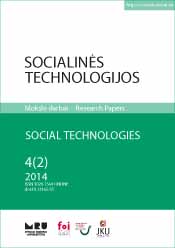TAPATUMO ĮTAKA EFEKTYVIAU SPRĘSTI VISUOMENIŲ VALDYMO PROBLEMAS TINKLO VISUOMENĖSE
THE INFLUENCE OF IDENTITY SOLVES THE PROBLEMS OF MANAGEMENT OF THE COMMUNITIES IN THE NETWORK SOCIETIES MORE EFFECTIVELY
Author(s): Benas BrunalasSubject(s): Social Sciences
Published by: Mykolas Romeris University
Keywords: social technologies; identity; network society; structure and structural unit; realism; control of identity.
Summary/Abstract: The two scientific perspectives that compete in social sciences – positivism and postpositivism – present two different perceptions of the realities and their interpretations. The logic of the two different positions perceives identity and the ratio of structure to a unit differently. From positivist perspective, the dominating statements propose that preconceived and ‘stationary’ structures, the states of units of structures and identities exist, whereas post-positivism approach suggests that a circulation of units, structures and identities is a constant action. An aspiration to strictly conform to the logic of one or the other scientific paradigm, while forming ontological and epistemological positions, leads to dead-end, and the initial aspiration of a scientific theory – practical benefit – remains unfulfilled. A way out of this ‘theoretical maze’ is assisted by propositions of scientific realism, which allows combining positions, while adjusting the attitudes of positivism and post-positivism which look contradictory from a standpoint. These propositions follow subjectivistic ontology; however, they deny the fact that it necessarily has to implicate positivistic epistemology. By using the statements of scientific realism, the article justifies a transitional way between the two camps (positivism and post-positivism), while arguing that only by integrating different positions, the research of identity that points to practice is possible. This is especially relevant during the analysis of the structure and the ratio of the structure to a unit. The article holds an attitude that a network society, which has a fresh quality and highlights a double-sided relationship of the structure and a unit of the structure, has been developing in the 21st century. The specific structure of the network is a decentralized structure, which power center can be perceived as an actual network’s self-regulating mode, which ‘indicates’ and ‘assigns’ which identities of the knots in the network are suitable and which ones contradict the structure. In this sense, identities of the network structure’s knots (units) are political and active components of the regulations of the network structure. Because of the two-sided structure and the relationship between structure and unit, the social space is both dynamic (it is being constructed socially) and on some level (at a certain time point in time) permanent. Accordingly, this leads to the proposition that different qualities of the structures will dictate international practices and that in different kinds (types of logic) of structures, subjects that sustain different practices will gain distinct success. Hence, the identity of the unit can directly relate to the power of the nation and to the possibilities of increasing the competition in the system.
Journal: Socialinės Technologijos
- Issue Year: 4/2014
- Issue No: 02
- Page Range: 348-360
- Page Count: 13
- Language: Lithuanian

